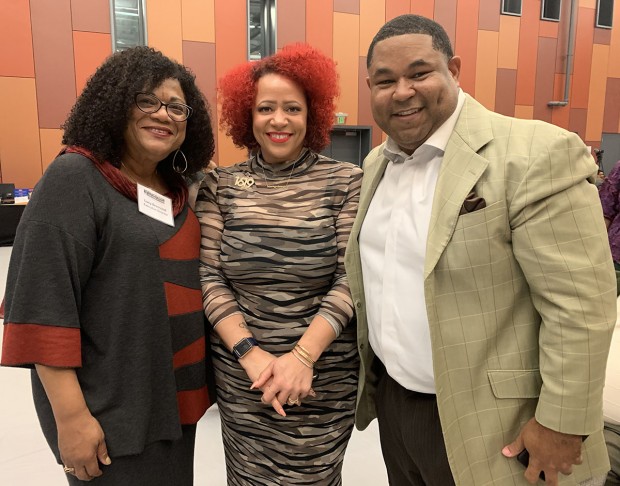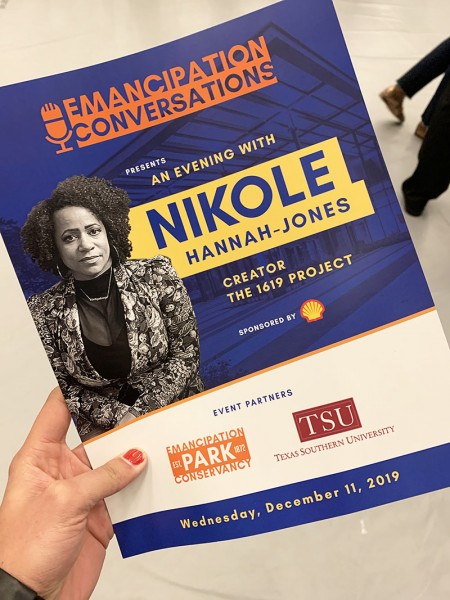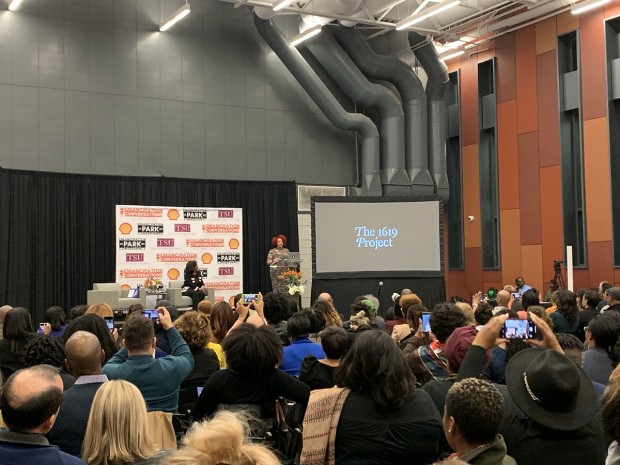Emancipation Park Kicks Off Lecture Series

Nikole Hannah-Jones doesn’t usually cry in the newsroom. “It’s unprofessional,” she says. But when the 43-year old fiery red-head, an investigative journalist with a slew of reporting awards to her name, saw the August 2019 issue of the New York Times Magazine laid out, she couldn’t help but start to sob.
“I literally broke down crying,” Nikole shared during a Fireside Chat this week with Melanie Lawson, news anchor for ABC 13. “It was a culmination of my life’s work in many ways.”
The issue that got Nikole emotional isn’t your typical magazine. It is double the size of a regular NYTimes Magazine and part of a much larger Times initiative called The 1619 Project, whose stated goal is to observe the 400th anniversary of the beginning of American slavery and “place the consequences of slavery and the contributions of black Americans at the very center of the story we tell ourselves about who we are.”
Nikole, a staff writer for The New York Times, paid a visit to Houston this week. She served as the inaugural speaker for a new, quarterly lecture series organized by Emancipation Park Conservancy in the Third Ward neighborhood. The first lecture, on Dec. 11, drew more than 400 people, who gathered in the Park’s gymnasium for an inspiring conversation about the legacy of slavery.

Emancipation Park Executive Director Lucy Dremond (left) and Board Chair Ramon Manning (right) welcome journalist Nikole Hannah-Jones to the inaugural Emancipation Conservation Lecture Series. (Photo: Pooja Salhotra)
Nikole started by launching into a story of American history. In August 1619, one year before the iconic Mayflower ship carried the first English Puritans to the New World, 20-30 enslaved Africans arrived in America on the White Lion.
While most high school students are taught about the Mayflower in their U.S. History class, few have even heard of the White Lion, said Nikole.
Last year, with the approach of the 400th anniversary of the arrival of White Lion – the first ship carrying enslaved Africans to America – Nikole felt it imperative to recognize the moment, instead of letting it pass unnoticed.
“I understood I had an opportunity, but more than that, an obligation to do something to ensure this anniversary would be commemorated,” Nikole said during her lecture.
The 1619 Project is, at its core, a reframing of this country’s history. The project includes contributions from other journalists, creative writers and artists who discuss how slavery’s impact infiltrates all aspects of American life today, from healthcare, to our criminal justice system to our taste in music.
Nikole argues that although slavery became illegal with the passage of the 13th Amendment in 1865, its legacy lives on in ways many fail, or refuse, to comprehend.

The Emancipation Conservation Lecture Series kicked off on Dec. 11 with guest speaker Nikole Hannah-Jones. (Photo: Pooja Salhotra)
The project has made a splash across the country since its publication in August. Copies have sold out multiple times, with people waiting in long lines at bookstores to buy it – the same way people wait in line for Jordan sneakers, Nikole said.
Public schools across the country, including in Chicago and New York City, have added the project to their curriculum, using resources established by The Pulitzer Center to engage students. At the outset of the lecture at Emancipation Park, Texas Southern University representatives likewise announced that The 1619 Project will become required reading for all freshman at TSU.
Though Nikole put months of time into the project, she never anticipated this wide-scale reception.
“I can tell you when I initiated this project, I had no idea it would go into classrooms the way that it has,” Nikole said. “The most profoundly fulfilling thing for me is that maybe our students can learn this history right the first time.”
The next lecture in the Emancipation Park Conservation Lecture Series will take place Feb. 10 and will include a dialogue with Damien Sneed, a multi-genre recording artist. The lecture will feature a conversation between TSU Music faculty Jason Oby and Damien about his upcoming We Shall Overcome Tour, celebrating the 36th Anniversary of Martin Luther King, Jr. Day.
Editor’s Note: For more about Emancipation Park Conservancy and the Third Ward neighborhood, read Pooja’s feature story here.
Want more buzz like this? Sign up for our Morning Buzz emails.
To leave a comment, please log in or create an account with The Buzz Magazines, Disqus, Facebook, or Twitter. Or you may post as a guest.



